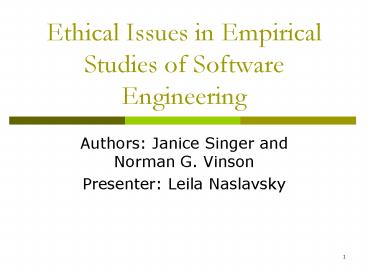Ethical Issues in Empirical Studies of Software Engineering - PowerPoint PPT Presentation
1 / 16
Title:
Ethical Issues in Empirical Studies of Software Engineering
Description:
Dr. Jonas collects data by observing SE teams at local companies. ... Misapplication of reputed methodologies; Methodological oversights; Use of disproved methods. ... – PowerPoint PPT presentation
Number of Views:180
Avg rating:3.0/5.0
Title: Ethical Issues in Empirical Studies of Software Engineering
1
Ethical Issues in Empirical Studies of Software
Engineering
- Authors Janice Singer and Norman G. Vinson
- Presenter Leila Naslavsky
2
Introduction
- Researchers conducting Empirical Studies of
Software Engineering (ESSE) often face ethical
dilemmas - Dr. Jonas collects data by observing SE teams
at local companies. He then categorizes the team
according to their success at collaboration . A
few weeks into the research program, a manager
asks to see Dr. Jonas field notes and wishes to
know how his company compare to other companies
3
Introduction
- The paper is a first step towards the creation of
a set of ESSE guidelines. - This discussion is relevant to research that
- Employs human subjects or
- Collects information that allows identification
of individuals.
4
Motivation
- Why should we (researchers) care?
- Risk losing cooperation and honesty if upset the
subject - Risk losing access to the subjects, funding or to
other resources if upset subjects employers or
managers. - Lack of code of ethics that deals with humans as
subjects and SE per se. - Some ESSE peculiarities
- Organizations serving as research subject
- Long-term classroom studies
- Use of artifacts (e.g source code).
The paper aim at presenting the standards not
debating them
5
Outline
- The authors reviewed 22 existing codes (e.g by
ACM, IEEE-CS) and abstracted high-level ethical
principles - Informed consent
- Scientific value
- Beneficence
- Confidentiality.
6
Informed Consent
- Full informed consent on the part of the subject
to participate in the research. - Must contain at least
- Disclosure
- purpose, procedure, risks to subjects,
anticipated benefits, statement offering to
answer subject questions. - Comprehension and competence
- Voluntariness
- Right to withdraw
7
Informed Consent - Example
- Dr. Gauthier does not have access to industrial
software engineers to test her tool. She uses the
students as subjects - No consent was obtained from students
- Problem
- Professor power over students grades
- Solution
- Use another professors students
- Do research after end of semester
SHOULD generally obtain informed consent of
subjects/host organizations
8
Scientific Value
- Scientific Value Components
- Importance of research topic evaluated through
risks and benefits to subjects and society. - Validity of results results should reliably and
faithfully represent reality. - Invalid results are produced by
- Misapplication of reputed methodologies
- Methodological oversights
- Use of disproved methods.
- Is critical some researchers are not completely
familiar with the methodologies they use.
Weighted against possible harm to the subjects,
a study without merit should not be undertaken
9
Beneficence - Human
- Favorite balance of benefits to harm
- Tradeoffs that can adversely affect one
stakeholder group will sometimes need to be made. - Example
- Software engineers who maintain the source code
have not been so appreciative of research on
source code reengineering and automated
translation. - Minimized by
- Involve them in all issues surrounding the
project schedule and new source code integration.
- Give them time to explore new code
- Training on new language.
10
Beneficence - Organizational
- Conflicts of interest between hosting
organization and public at large - Example
- Public negative evaluations of companies can
cause financial harm. - Disclosing of flaws on a companys software
development process. - Informing management of process problems could
result in dismissals, thus harming individuals.
11
Confidentiality
- Confidentiality Components
- Anonymity no one can identify participants of
experiment - Use subject number or aliases
- Subject name not linked to their data.
- Confidentiality of data privacy of data
collected. - Consent document inform who will access raw data,
and for what purposes.
12
Confidentiality - Example
- Research on how novice programmers gain expertise
realized in a small company. Interviewed 10
novices and 2 gurus. - Difficulties for confidentiality
- Conducted study in workplace
- Few subjects
- Information in report could be used to identify
individuals. - ESSE studies are often on few subjects and occur
in workplaces - Researches should disclose the limits of
confidentiality as part of the informed consent
procedure.
13
Consent, Confidentiality, BeneficenceTaking the
Measures of Artifacts
- Artifacts can Identify individuals who created
them, raises issues of - Consent, confidentiality and beneficence.
- Need the consent of organization to access their
source code and documentation. - Programmers dont expect the their work to remain
private. - It is ADVISABLE to involve programmers in the
research. (slide 9).
14
Exceptions
- Exceptions to any set of guidelines can occur
- Informed consent an confidentiality are not
required when - No information in the raw data identifies
individuals. - The expectation of privacy doesnt exist.
- More harm result in maintaining confidentiality
than from breaching it.
15
Conclusion
- To avoid the dilemma presented in the
introduction - Consider the ethical implications of the research
BEFORE - Ensure rights and responsibilities understanding
by hosting organizations and subjects - ESSE community need to develop code of research
ethics adapted to the peculiarities.
16
Discussion
- Since programmers expect that their code will be
reviewed, it SHOULD NOT be necessary, from an
ethical perspective, to obtain their consent to
use their code. (agree? disagree?) - In practice it is not possible to eliminate
management coercion. Is it better if researcher
or manager contacts the subjects of research? - If the researcher knows an employee will be laid
of next week. This employee says he cant be
interviewed a certain day because he is going to
buy his house would you warn him?































